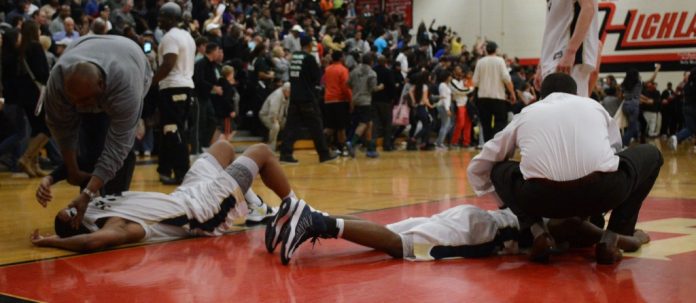The final buzzer sounds; the clock, motionless and still, is stuck at 0:00.
There are no more chances, there is no more doubting, there is no more questioning; this is the end. As the opposing fans pour from the sidelines, streaming down onto the court, you solemnly shuffle to the locker room, dejected and teary eyed. It is painful, no doubt, and it stings. Hours and hours, months and months, years and years of work find their result: that is, a loss in the “big game.”
While the result is fixed and concrete, reduced to a few permanent numbers on a stats sheet, there is more to it than just a stats sheet, there are emotions. You, along with your team, have worked tirelessly to get to this stage. It’s not supposed to happen this way; this isn’t the way you pictured it. Yes, you’ve known that only one team can emerge victorious, but that team was supposed to be yours.
So what do you do next?
You’re an athlete. You’re bred to compete. You’re bred to, among other characteristics, to win. So naturally, when dealing with a loss, it’s quite difficult and heartbreaking- it’s like crumbling in the midst of the Kentucky Derby as you approach the finish line.
According to Elisabeth Kubler-Ross, who in 1969 proposed her theory of the “five stages of grief,” those who are faced with extreme difficulty or emotional distress often encounter, in no particular order, various phases of grieving; denial, anger, bargaining, depression, and acceptance. For athletes, who must spontaneously react as the loss unfolds, the first is often the experience of denial, or an inability to view the reality of the situation.
“As soon as the buzzer went off, you can’t really comprehend what’s going on,” explained Michael Bejarano ’14, a point guard on the basketball team which recently lost to Richardson Berkner in the Regional Quarterfinals of the playoffs. “You see that your season is over, but you still haven’t really accepted it yet. It’s different to be in the moment experiencing it and then later on the next day, next week, going over it, thinking about it. When it actually finally sinks in…. that’s when it really hits near to you.”
This bewilderment can sometimes quickly morph into anger, says wrestler Henry Harms ’14. “I just get angry. I just in my head think of the things that I could do better. When you’re done with a match, if it was such a close match, you really get frustrated because you know that in the end you made a mistake and it’s only you who can correct what you did.” Wrestling, along with most other individual sports, carries such painful losses, as the athlete has no teammates for support, and the loss falls squarely on his shoulders.
The comfort of a team, filled with players who experience similar emotions, might provide some initial solace; but this can only bandage the wound to an extent. Covered under, covered within, remains the daunting truth of the loss. “I think that [the experience] is more, depending on the individual,” remarked basketball coach, Chris Hill, “as opposed to the type of support that they receive. Everyone’s going to deal with it in their own way. You have a little more support with a team, a couple of guys who know exactly how you’re feeling, but I think it’s tough for everybody. You still didn’t accomplish something that you really wanted to accomplish.”
If the individual or his team is at midseason, with other games on the schedule, the recovery process must be significantly expedited. “We’ve got work to do,” explained Hill. “My way of helping them is making sure they understand we need to get better and move on from it.”
Similarly, Jesuit’s head football Coach, Brandon Hickman, instituted what he calls a “twenty-four hour rule” for these in-season losses; for the best interest of the team, his athletes “can only be upset for twenty-four hours,” after which they must return their focus to the next task on the list. This ensures that the team has ample time do whatever it needs to prepare for the next game, such as watch film or take a few extra repetitions.
But for those end-of-the-season losses, as was the defeat against Berkner, the focus is much more on the individual and what he needs to do to cope with the dissappointment.
Coach Hill, in general, prefers to “leave [his players] alone” so that they can cope with the loss in whatever way they feel best or feel necessary. “I think you got to just let them heal….you’ve got to move through it however you need to move through it.”
Some can bounce back quickly, others cannot. Some can return to school the following day; but for some, depression gets the best of them, and they are not able to rejoin the school immediately. Although many of Hill’s players are “right back in the gym the next morning,” he solemnly admits that there are some, especially seniors, that “[he hasn’t] seen yet” since the loss.
A senior, barring the slim possibility of playing at the collegiate level, is likely at the end of his road, not only at Jesuit but as a competitor in his respective sport. He doesn’t “have next year to hope for,” recalls Bejerano, a truth that can exponentially multiply the difficulty.
But, like anything else in life, the grief does pass with time, and many athletes seek the supportive community which Jesuit provides as a precipitant of their acceptance. One of Jesuit’s great qualities is its ability to unite an entire group of young men who all work for and with each other, and in turn, this community cushions the fall of its members.
“I would think that a lot of players who rely solely on athletics in their life don’t really have anything else to fall back on to support them,” says Michael Bejarano ’14. Conversely, “the [well-rounded] environment which Jesuit creates is extremely beneficial to anyone who is trying to cope with such an experience.”
“It’s a lot different,” according to Henry Harms ’14. “As someone from Jesuit, because we are so well-rounded, we are way more sportsmanlike,” and are therefore able to recover from defeat with greater ease due to the personality of the school.
“It seems to be that students, whether they participate on that team or not, are very supportive of their fellow classmates,” reflects head soccer coach, Charlie DeLong. “They try to help to alleviate that stress and that pain.”
“I think we have great support here,” claims Coach Hill, emphasizing how the community mollifies the sting of a loss as time passes. “If you look at our crowd, you’d have thought we were undefeated going to win state. I think it’s easier to feel better with those things when you have people that care about you that way. I think that it really does help when you know that you have teachers, friends, coaches, and teammates that are backing you and supporting you. There’s eight seconds left in the game, we’re down nine, and our crowd starts cheering ‘We love our team’ and we just lost. That was special. I think it absolutely helps guys knowing that people are proud of you and knowing that you gave it everything that you could.
So the athlete, the rider, finds his way back onto the horse, and trots across the finish line; albeit not always in first, but he always finishes.






